Development in Afghanistan: A Personal Reflection on Progress, Challenges and Lessons Learned
17 April, 2023
A blog post by Dr Peter Hughes based on work with Action Against Hunger (Action contre la faim) and the Dutch Mental Health Surge Support and Psychosocial Support Programme (DSS MHPSS).
October 2022
This was to be my third trip to Afghanistan.
Background Afghanistan
Afghanistan is a low-income country afflicted by conflict over many decades.
The population is 38 million people. There is a high under 18 population with 46% under 15 years. Life expectancy is low, at approximately 65 years. Illiteracy rate is high. Literacy is 37% with more female illiteracy than male.
The Taliban took control of Afghanistan on 15th August 2021 - one consequence of this has been a loss of international support for health and social care.
45% of previous gross domestic product (GDP) was international in origin.
There are reported to be 129 psychiatrists in the country, but it is unclear how many have left in the past year. Most are in Kabul, Central Region with an estimated 0.34 per 100,000. There are reported to be 2 psychiatrists working with children. 1 in Herat and 1 in Kabul.
There are a handful of psychiatric units throughout the country.
Afghanistan has often been cited as an example of good practice in mental health with its psychosocial workers and tireless commitment over the years to mental health.
What is clear is that health service needs are dominated by women and children. Women will not see male health workers meaning that having sufficient female health workers is crucial. Even if a woman agreed to see a male health worker, it is unlikely her husband would allow this. In fact, the culture and customs of Afghanistan appeared to be close to the tribal areas of Pakistan that I had visited in the past. It’s clear that gender issues are so fundamental to the future of Afghanistan and its people’s health.
Like many other countries, people attending health services have a strong expectation of a medication-based treatment for their problems, even if not indicated with x-rays or scans.
Problems with stress and stress-related psychosomatic problems are extremely common. Conversion disorder is very common. Mental illness is highly stigmatised and seen as a spiritual problem by many.
1990s
My first trip was as a young man. Looking back now, I realise the risks I took were rather unwise; this was crossing the border into Russian occupied Afghanistan, which included the daily reality of no water, electricity and daily Russian aerial bombings.
I had been spending time in Khyber Pakhtunkhwa, or Northwest Frontier province as it was called then, in Peshawar, Pakistan. I met so many Afghan refugees fleeing the war at that time. I saw depressed people without hope and manifesting somatic symptoms. This experience really helped me during my two trips in 2022 in understanding the context in Afghanistan and the culture. The situation remains similar to this day with people desperate to flee Afghanistan. Many Afghan people I met in 2022 had actually spent time themselves living in Pakistan. There is a close bond between eastern Afghanistan and Pakistan.
Although somewhat dangerous to visit at that time, what I recall was the beautiful mountains, the hospitality and kindness of the local people. What was most striking was the sense of hope in the future which is now sadly lacking.
June 2022
I was delighted to be invited to return to Afghanistan.
In June 2022, I was asked to deliver training in mental health in primary care, namely the mhGAP (Mental Health Gap Action Programme). This was a relatively brief trip of a few weeks.
Arriving in Kabul Airport brings up all the memories of the horror of the August 2021 evacuations that we saw on television. There was no sign of this on arrival - just a busy, somewhat chaotic airport, and my first face to face with the Taliban. What I wasn’t expecting was having to leave my passport with the airport authorities and not see it for a week.
Thankfully, I got picked up by a car and was transported to the heavily fortified United Nations compound. From then on, and at all stages henceforth, I was prohibited from standing or walking on a public street.
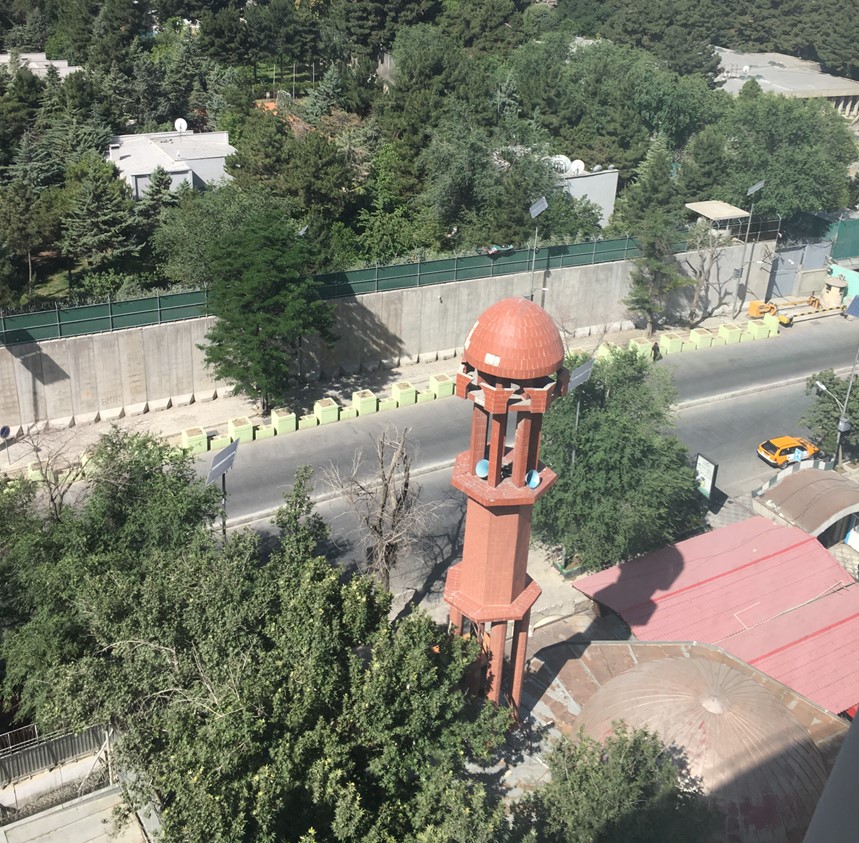
The compound had a subculture of UN humanitarian workers. All were friendly. There was everything you needed, such as shops, restaurants. There was a heavily fortified checkpoint which was comparable to getting in and out of the checkpoints at Gaza. I stayed in a converted shipping container which was fine I would say, but I was glad I wasn’t staying for too long this time.
We then embarked on an intensive course in integrated mental health in primary care which was held in Central Kabul. Travel was escorted with an armoured vehicle to and from the compound. The hotel was heavily fortified, but we had views of the mountains that surround Kabul.

We trained a number of psychiatrists and doctors including a mixed gender participant list and a female co facilitator. With training, you wonder at the beginning if the participants will engage and talk or be quiet and perhaps shy away from active learning such as role play. I shouldn’t have been concerned, the Afghans were a very active group and eager to share their knowledge and learn.
Some of my experiences of Afghanistan were heart-breaking, especially when talking to some of the female doctors who lost their jobs with the arrival of the new Government. They were asked not to return to work. They feared for their daughters and how they would get an education. Many in Afghanistan spend much time thinking how they can leave. This is especially so for anyone with daughters. Girls no longer can have secondary level education. Women need a male relative to move around in public. Hope seems to have gone.
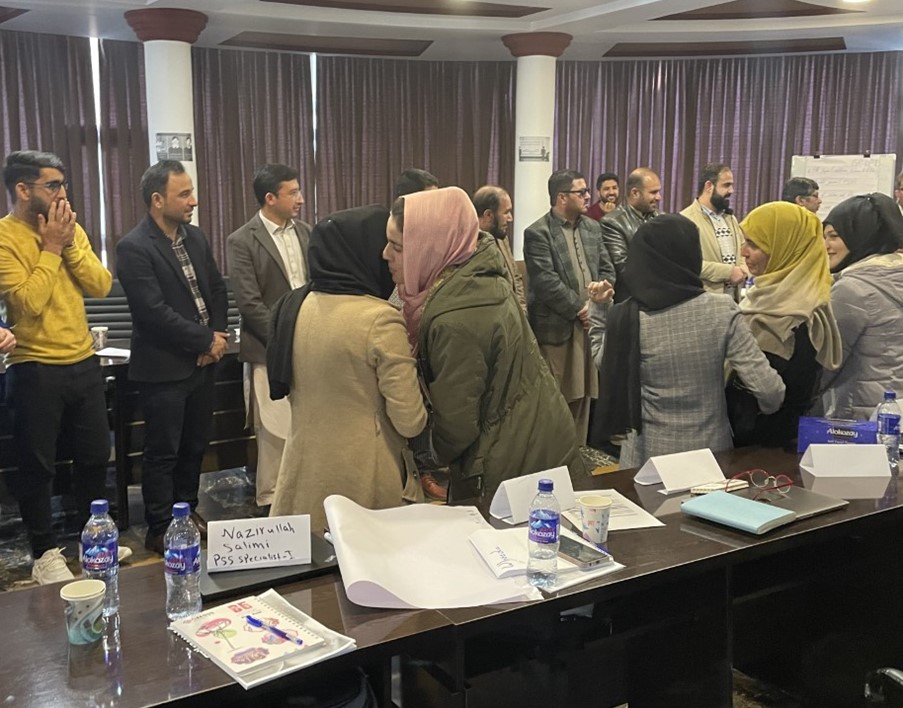
Many spoke to me of the difficulties of life in Afghanistan since the takeover in August 2021, with the loss of international funding for the new Government contributing to these difficulties. However, the truth is, life has been difficult long before the invasion. Problems of poverty and social injustice predates the new government. The view of the Taliban are shared by many in Afghanistan, particularly in rural areas, but a bit less in cities like Kabul. Many have left and started new lives in other countries but would love to return to their homeland when the situation improves.
It is unclear what the future holds for women in Afghanistan. Themes that were pervasive in our training were protection or safeguarding as we would term it in UK. Women have a high risk of being victims of abuse with reports of forced marriages and child marriages and drug use is a big issue for males. Education for girls in the country in secondary and tertiary level has been banned so lessons are now conducted in secrecy.
Depression seems to be very common. Somatisation is a common manifestation and conversion disorder is much more apparent, unlike my experience in the UK and other countries. Family conflicts are common and cause immense distress.
The rate of suicide is reported to be relatively low in Afghanistan. This is due to socio-cultural factors. However, we heard of many stories of self-harm and suicide in both genders including overdosing, hanging and self-immolation. Suicide is illegal in Afghanistan, but the law is not enforced generally. It is a very sensitive area culturally and a taboo topic carrying other repercussions. For example, the whole family may be stigmatised by a family member's suicide. Anecdotally the reports match what we know of suicide, i.e., higher rate of successful suicides by men and self-harm by women. There is a real dilemma of sending someone home who has tried to take their life when the reason for this may be back at this same home.
Children’s problems are common especially food insecurity and malnutrition. Children often go to traditional healers for their problems. Epilepsy in children can be stigmatised and seen as a demonic possession.
Many psychiatrists might think that psychosis is a core part of mental health in primary care. This is not the case. The amount of psychosis varies but is still relatively uncommon in the community. However, effective treatment can transform the person affected and see a change in the family and community.
There is abuse of human rights of people suffering from psychosis. A common belief is possession by Jinn or spirit where people may be tied up at home with supernatural causes being a common attribution. First line care are traditional healers and generally the care there is benign with religious healing principles. Outside of specialist settings, which are rare themselves, there is a lack of capacity to treat psychosis in the community settings.
Dementia is seen as a rare condition due to low life expectancy in Afghanistan. There are no nursing home facilities, so all support is from the family. However, there were anecdotes we heard of people suffering from dementia amongst the training groups to indicate that it is relatively well known but limited treatment and support is available.
Substance use is a significant problem in Afghanistan. Opium grows throughout the country, especially in areas such as Helmand in the South. There are problems with methamphetamine and abuse of tramadol and benzodiazepines, the latter of which can be bought at local pharmacies without prescription. On the contrary, alcohol use is extremely rare.
The participants provided some sample cases that are representative of what they see in community settings:
- 25-year-old married women. She has 2 children. She has been feeling depressed [for a] long time because of poor economic problems. She is [always going to the] clinic and after [some time she explains the] above. She is jobless and her husband is jobless also.
- A woman with paralysis came to [the] hospital. She can’t talk and had this condition after her father’s death.
Themes were poor economy and family stress.
The training in Kabul has since been the impetus to a cascade of trainings around Afghanistan, especially in the East. This did give me hope as there are many people working tirelessly to make a difference even in the setting of frequent hardship.
I left Afghanistan with a plan to provide ongoing online supervision to doctors and psychiatrists.
22 June 2022
Shortly after my departure, an earthquake occurred on 22 June 2022, which was 6.2 on Richter scale and 2.5 miles deep and killed over 1,500 people. This diverted the programme to focus on the emergency earthquake response.
Some of the people I trained were deployed to the earthquake area. They used basic principles of Psychological First Aid (PFA) which is a way of meeting people’s basic and emotional needs when in distress. Colleagues told me of their stay in tents and hearing harrowing stories of whole families being wiped out. This was an area with very poor electricity supply, limited internet and deprivation even before the earthquake.
October 2022
This current mission of October 2022 arose out of a request from a French non-governmental organisation, ACF (Action Against Hunger), for support with coordination of mental health work in Afghanistan. My role was funded by the Dutch Surge Support programme on MHPSS and hosted by ACF.
The visa was the next hurdle which took longer this time. I therefore had to work from home in the UK before being able to travel.
My visa eventually came through and I travelled almost immediately to Kabul. There are currently two Afghan airlines that fly to the country, both of which are reliable. This flight was from Dubai to Kabul. In Dubai, you must travel to the very extreme end of the airport and then a bus takes you to a further remote section from where the flight departs.
You know that you are going to Afghanistan as soon as you arrive at the gate. There is a separate waiting area for women, people are dressed in shalwar and chemise, turbans, burqas etc. and usually there are a few expatriates like myself. Generally, expatriates in humanitarian work for a few weeks (5 to 8) in Afghanistan before compulsory rest and recreation leave. The R and R becomes so important as life is very restricted for them in Afghanistan.
Even though it wasn’t my first time in Kabul, the airport remained chaotic for me. At least this time, I knew I would get my passport back after a week or so. I was then waiting in the wrong place for my transport before eventually heading out the front gate and soon picked up by a vehicle. Then, a car to my new home.
This time I was staying in a guesthouse of ACF. This was a secure place where there was a safe room in each building of the compound in case of attack. Fortunately, I never had to use this. I then battled the mosquitoes and an incredibly uncomfortable mattress. This was soon sorted by my very hospitable ACF hosts. The compound had a gym, many kitchens and a cook. We were comfortable. The weather at this stage was warm, although Kabul can have 1 metre snow and go down to minus 20 in the depths of winter.
My life was pretty comfortable here. I would have a car with a guard to drive me morning and night to the office and back – a journey that lasted less than 5 minutes. We were never allowed to walk on the streets freely. My life was office, guest house, training venue. We had electricity gaps at night and day, but we always had internet. Internet had an emergency battery supply as seen as an essential need in case of security problems.
We were allowed to visit one or two shops and restaurants. This was a lifeline but always escorted and in high security. The streets would appear like any other South Asian Muslim city apart from the relative lack of women and the lack of all music which is not permitted. Sometimes we could see the homeless opium addicts lying on the ground around the city. We had a curfew so always needed to be home early.
Weekends were restricted but we could go to one restaurant at certain times. I learned that a friend of mine with whom I worked with in Haiti was now based in Kabul. So, a weekly restaurant visit to catch up was a highlight. Also, there was the socialisation at the guest house and catching up with others. I have to confess to having watched so much on Netflix which was available and a lifeline for the lonely weekends and evenings stuck indoors.
Life for the average Afghan is not easy. Electricity supply is poor, with maybe less than five hours per day, and when this is available is never known. Winter cold is dreadful for Afghans with no electricity. My colleagues would have three to four different transports to get to and from work through traffic.
Life for women is another story. More and more restrictions came in as time goes on. Girls can’t go to high school. I visited Kabul Education University one day and met the female Vice Chancellor. We toured the campus and met the teaching staff. There were so many female students around even in off term time. It was devastating then to hear that women were banned from tertiary education. Tertiary education was permitted until December then stopped.
I spoke to women who told me that they were in tears on hearing the news of banning of women at tertiary educations and any little hope they had in Afghanistan was stripped away.
Women are now compelled to cover their faces. Sometimes one sees the traditional Afghan Burqa, but this was less than I remember than in North Pakistan. Women tend to wear a Covid mask which I heard is a way of fulfilling the law but making a symbolic gesture to the government.
In early November 2022, the government banned women from going to parks and gyms. I found the lack of women in parks ghostly and particularly chilling.
Another vulnerable group identified are the adolescent males who get caught up in drug use. Indeed, the amount of drug users in Afghanistan, like its neighbour Iran, is staggering and likely reflects the misery of day-to-day life.
Afghanistan is a very religious country, even apart from the Taliban. At village level there is a deep religious conviction, very similar to North Pakistan. During training, I saw how precious religion is for people and what strength it gives them. Along with the strong families and community, religion is a factor that provides resilience to the Afghan people in general. All training and other programmes must consider religious sensitivities and focus on family.
Afghanistan has many different diverse regions each with their own culture and character. With my restricted visa, I was unable to leave Kabul although I met some people of the Hazara community. These people face stigma due to their faith and ethnicity. In the past there have been Sikhs, Hindus and others but it seems that everyone has just about left now.
The Taliban presence is everywhere. From my office, I could look out and see what must be one of the largest, if not the largest, flagpoles with the white Taliban flag, on the top of the mountain facing us. The white flag of the Taliban is everywhere.
On the streets one can see the young Taliban with their guns and characteristic shoulder length hair. What is jarring is men that look like they are teenagers carrying rifles. Sometimes the Taliban soldiers have their faces covered. There are checkpoints and many trucks fitted with guns that are part of the cityscape of traffic.
Professionally, we would meet people from the Ministries. I never had any problem and was always treated with great politeness and respect. The Taliban represent a popular move in Afghanistan that would echo with many people throughout the country, particularly in the villages. For me, I needed to respect that this was a view in Afghanistan even when I struggled to agree with some of their viewpoints.
Night by night, we would hear what sounded like fireworks. However, I needed to remind myself that this was indeed Afghanistan. This was gunfire. The trick was to see how far away the shots were and if the next round was closer then it would be time to worry. Another bad sign would be if the gunfire was on each side. It was never a problem for me. I would just remember that this was most likely a wedding or cricket match. People celebrate here by firing their guns in the air and guns are ubiquitous.
The only security risk I encountered was an Islamic State – Khorasan Province (ISK) attack in Kabul one day. I was doing a training session in Central Kabul in a hotel and a colleague came in at the end of the day to say there were reports of a complex blast and street fighting outside our hotel. Next, I could hear the blasts and shooting. I felt quite safe in our secure hotel, that was fortress-like from a security point of view. I waited a few hours until our organisation security came to bring me out safely. Several fighters and members of the public were killed. Security levels were higher after this. We travelled in convoy, and it was only with great trepidation that we resumed training in this venue.
My work was to support coordination of mental health work in Afghanistan amongst state and international organisations. What helped me greatly here was my time and experience of formerly being the Chair of the London Division of the Royal College of Psychiatrists. It was about advocacy, reaching out and engaging with government and other organisations - national and international. We conducted a number of training activities and workshops which were relatively easy to set up and well attended. I did not do any clinical work directly. The role of the international psychiatrist can be often a somewhat pedestrian one being in an office stuck at a laptop. However, the trainings were a joy to deliver.
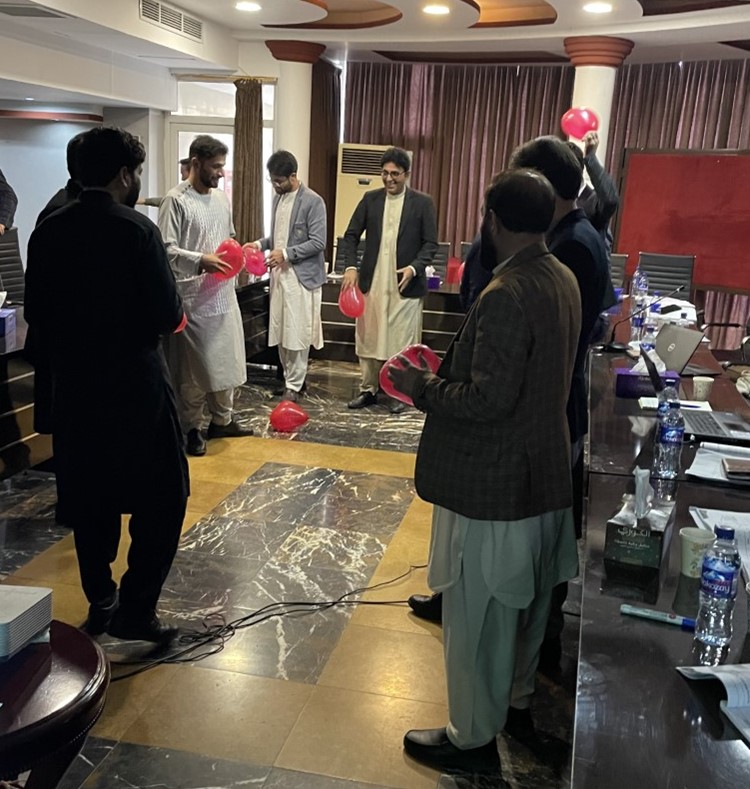
There were a number of phases in this type of work. There is an initial period of trying to pick up information on background followed by a frantic period of getting everything covered in time and finally a feeling that one is leaving too early. In fact, there was no possibility of extending my time as my visa was not extended. My visa also prevented me leaving Kabul.
My work was in MHPSS (Mental Health & Psychosocial Support) which was trans-professional. I did not need to be a doctor, psychiatrist, nurse or psychologist but needed to have mental health skills that covered mental illness and psychosocial support. A lot of my time was spent on non-medication approaches to health with stress management etc.
My office was next to a phone line service for people in distress to connect with counsellors. This was staffed by women and men however I am unsure if the government still allows women to continue this work due to further restrictions imposed since I left. The stories were depressing. Women could ring only if their husbands allowed them to. Sometimes women would ring secretly. The calls were from people in distress, depression and social adversity. We heard about forced marriage, child marriage, domestic violence and economic struggling. One call, I remember, was from a woman who tried to self-harm using a Kalashnikov rifle but survived.
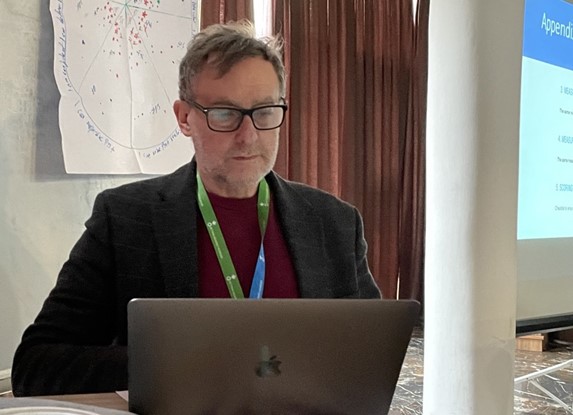
End of November 2022
We had our first workshop on supervision and teaching skills.
Our plan was to have a succession of such workshops to reinforce the message of supervision and ensure sustainability. We knew that training is not sufficient without adequate supervision afterwards to power any intervention. It was also an opportunity to introduce the new WHO-UNICEF electronic tool of supervision called EQUIP (Ensuring Quality in Psychological Support).
Our next workshop was on emergencies which was important as Afghanistan can be seen as in a state of protected emergency, prone to natural disasters and climate adversity. We heard harrowing stories of the earthquake with multiple casualties and the adversity faced by first responders. This earthquake exposed hardships such as difficult access and living situations for first responders.
Psychological First Aid was the key MHPSS intervention which is a model of helping people in distress. There were other stories of bomb blasts, road accidents, floods as well as emergencies increasingly arising out of climate change. This allowed reflection, learning from each other and development of an emergency plan.
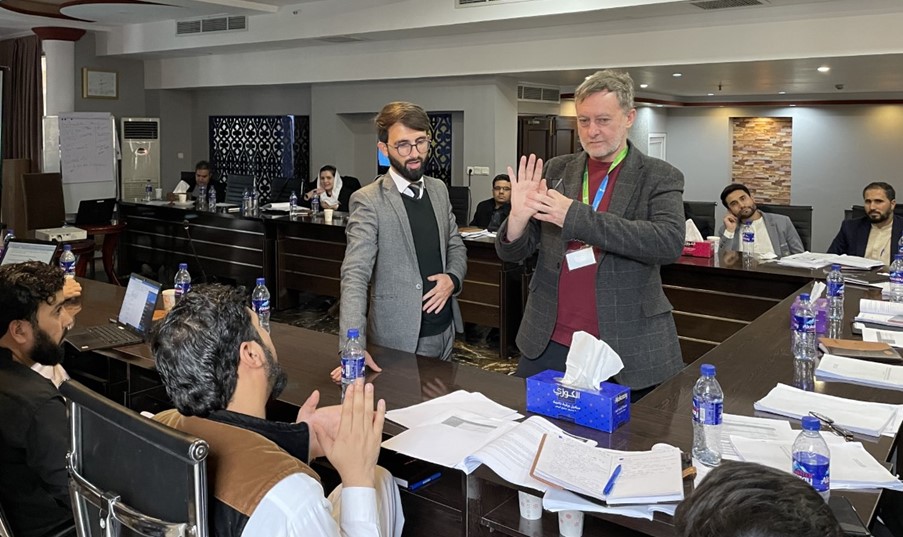
Early December 2022
We had a six-day workshop on problem solving called PM+ (Problem Management Plus). This was based on a World Health Organisation (WHO) manual.
The intervention consists of two assessment sessions then five intervention sessions. The intervention sessions were individual and took place once a week for five weeks. and involved stress management, problem solving, relaxation, behavioural activation and social mobilisation. The training was great, and I could really see this intervention working in Afghanistan. They were not about making a diagnosis but generally for people with distress, depression or safeguarding issues. So often the cause of people’s distress are social factors and problem solving was absolutely the right approach.
During these sessions, I began to hear some of the big social problems in Afghanistan - forced marriages, selling babies due to poverty, conflicts with in-laws. I heard stories of 12-year-old girls married to men in their 30s and 40s, and even older, with no autonomy. I saw the pressure on these girls to have babies and, most important of all, to produce sons. On the other hand, I heard the protective force of religion and family.
Below are some of the sample cases from these sessions (exact texts from participants used):
- One of [the] biggest case[s] I saw [was] of [an] 18 [year old girl]. She can’t go to school because of [the] current situation and has mental health problems.
- Symptoms [caused by] fear after change [in] government [included] blood pressure going up and [having a] heart attack.
- After collapse of [the] government, people face[d] many problems. [I] lost my job and was depressed for months, this affected [my] family and my son [and I am] still not successful.
- 42-year-old during bombing lost his arm and [is no longer] working. He thinks he is useless and is not the man he was before. He gets headaches, [is] angry all the time and [shouts] at his child.
There were other cases of secret romances and broken romances. This was surprising in such a restricted society on genders mixing. There is a huge stigma around LGBTQ+ issues. This is not discussed but they do have what is called transgender or third gender.
All these situations can be managed by PM+. Here, I was not a psychiatrist but a general health worker. Problem solving can be so fascinating as is the need to be creative with the solutions. Often the solutions generated by the group were religious in nature and family centred.
We next held a training on Psychological First Aid. This was a 2-day training session following requests from some of the national MHPSS organisations. This again brought up harrowing stories, some including children. We heard many first-hand accounts of dealing with emergency situations such as the recent earthquake, blasts and the chaos of August 2021 when the Taliban came to Kabul.
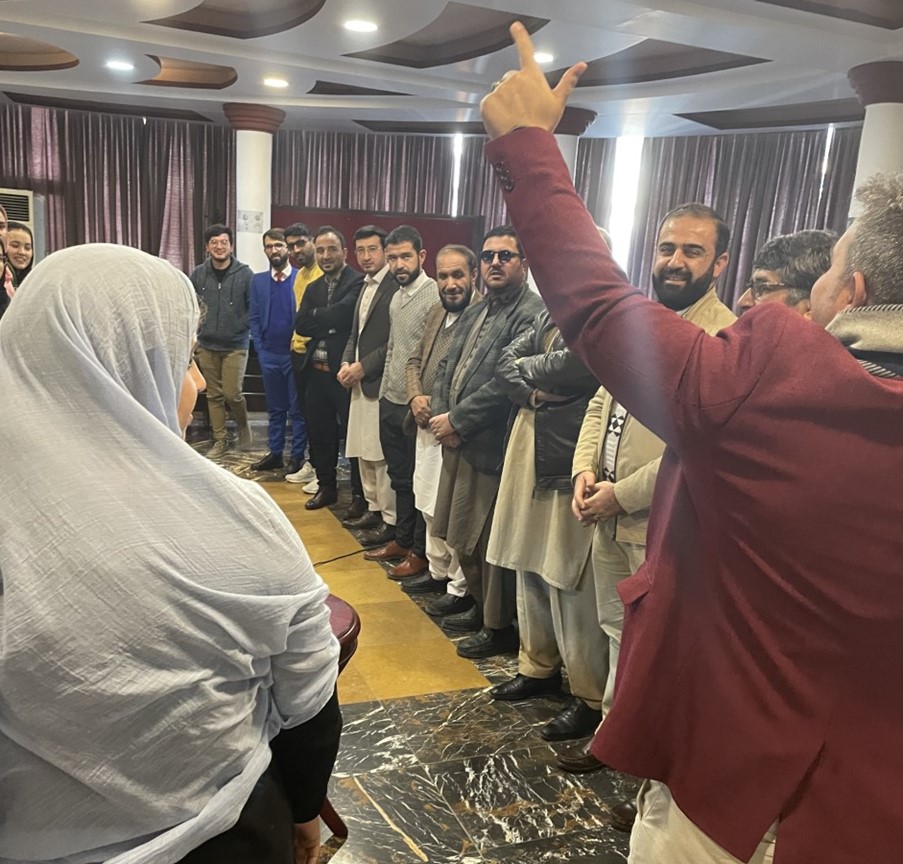
Mid December 2022
The last phase of my mission was a training session based on 'thinking healthy'. This was, in some ways, the most challenging area for me. It was a psychosocial intervention based on cognitive therapy, behavioural activation and problem solving. This intervention is used for women before and after birth and must be implemented by women, due to cultural factors.
With the governments restrictions on women working in organisations, I fear for this programme. Part of the programme involves a woman looking at a series of pictures that guide cognitive reframing. We were told that the pictures would need to be adapted to Afghanistan. A picture of a whole person would not be acceptable, even if a cartoon. The picture must be, at the very least, a partial view of the person e.g., leaving out an arm or a leg to be acceptable.
We had a midwife present who was able to really contextualise the intervention for Afghanistan and particularly how religion would interplay helpfully here. To further contextualise this training, we asked people what the issues might be for mothers or pregnant women in Afghanistan. It is a disaster for a woman to have a daughter. This was truly chilling and such a strong message.
We managed to get a more positive religious perspective - such as the daughter being “God’s will”. We even talked about the ‘daddy’s girl’ phenomena and that the husband and in-laws could grow to love “even” a daughter. We talked of the grandparent effect and overcoming their unhappiness with a daughter after they grew to know and love the child. The other pervasive theme was that of the conflicts with in-laws. This was soul destroying to hear stories of maltreatment by including threats of divorce if the child is a girl. I was impressed with this intervention and could see it working in Afghanistan as it doesn’t require literacy skills.
I remarked to my colleague one day that one of the women had not attended. I said that it was likely her husband stopped her coming here. My colleague said, “you are indeed Afghani now”. This was a depressing realisation of what the day-to-day struggles are of women in Afghanistan. Although it must be said that there are many who don’t share these views and bravely advocate for women’s rights.
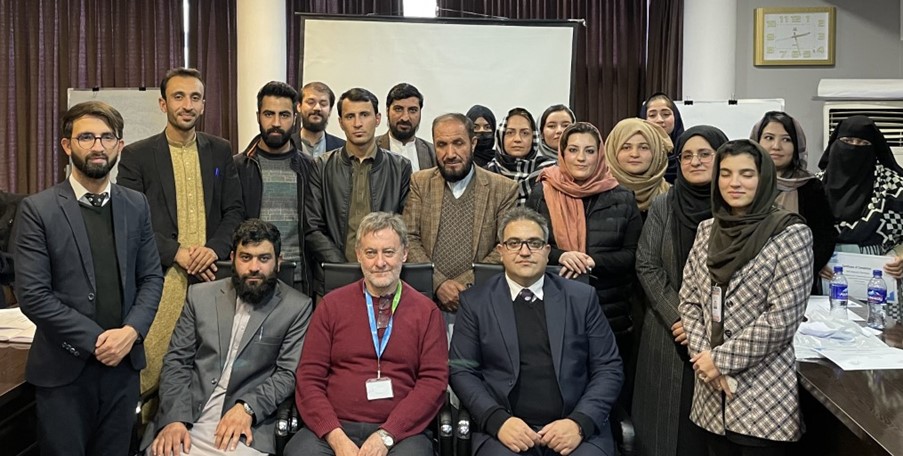
End of December 2022

The weather is beginning to get cold. For those with limited electricity, the next few months would be tough. People use a type of “bukhāri” heater which causes a significant amount of pollution. You could see a cloud of smog across Kabul at this time.
I began to get very concerned about the risk of travelling out of Kabul. The airport is always a risky place and with the number of foreigners leaving during holiday season the risk increased. It is especially dangerous at the point of leaving the car at the street and going through the first of multiple security cordons. But fortunately, there were no problems and I got out successfully.
Late December 2022 I returned safely to UK.
January 2023
Back in the UK, I was reeling from the Taliban pronouncement that women are prohibited from working in non-governmental organisations. Without trained women working in the health force there is no health access for half the population. I hope that this gets sorted as it is an existential crush to life in Afghanistan.
Being back in the UK, I enjoyed walking on the street, not having a curfew, going out at the weekends but strangely I began to miss my time and work in Afghanistan.


